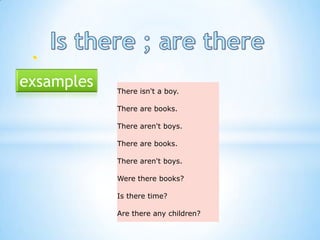
Presentación4 iii
- 1. exsamples There isn't a boy. There are books. There aren't boys. There are books. There aren't boys. Were there books? Is there time? Are there any children?
- 2. *interrogative statements) • • • • • Is there any sugar in the sugar pot? Is there any cool water in the fridge Is there any quiet place around here Are there any glasses in the cupboard Are there any chairs in your room?
- 3. *Can and could concept * Can and could are modal auxiliary verbs which express ability, permission, request, offer or possibility. * Could is originally the past form of can, but it also has certain functions which can does not, for example, it is used in hypothetical conditions.
- 4. * * She can speak English very well. * I could ride a bike, but * I couldn’t swim when I was seven years old. * You can have a coffee break after you type these letters. * Could I have some more salad with the meat? * Can I help you? Can I carry your bag? * It could rain this afternoon. * This can’t be true. * We could get there in time if you were driving a bit faster.
- 5. are also used to express the progressive (continuous) aspect of verbs of perception (see, hear, feel, taste, smell, etc.) and verbs like understand, remember, etc: * Examples: Can you see the woman standing over there? * We were so near the sea that I could hear the seagulls. * When she entered the kitchen, she could smell something * burning. * I put my keys to a safe place before swimming, but now I can’t remember where. * She couldn’t understand what the foreigner was saying.
- 6. concept As the past form of can, could is used for general ability in the past and in reported speech. * Examples: When she was younger, she could work for ten hours without stopping. * He said he could get his wife to come to the football with us. *
- 7. * It is not used when only one occasion is implied, except for negative sentences: * Examples: How many goals were you able to score on Sunday? * They managed to get to the station in ten minutes by taking a taxi. * I was able to find all the words in the dictionary, still I couldn’t translate the text.
- 8. * In requests, orders and suggestions, could is more polite than can: * Examples: Can I use your phone? * Could you please do me a favour? * Do you think you could help me for a few minutes? * Do the washing first, then you can clean your room. * When you’ve finished the letter, you could translate this article, if you like. * If you haven’t got anything to do this afternoon, you could clean the car.
- 9. * When we ask for permission, could is more polite than can. Could is not used to give or refuse permission: * Examples: Can/Could I ask you something? – Yes, of course you can. * You can go now if you want to. * Can I stay here for another hour? – No, I’m afraid you can’t.